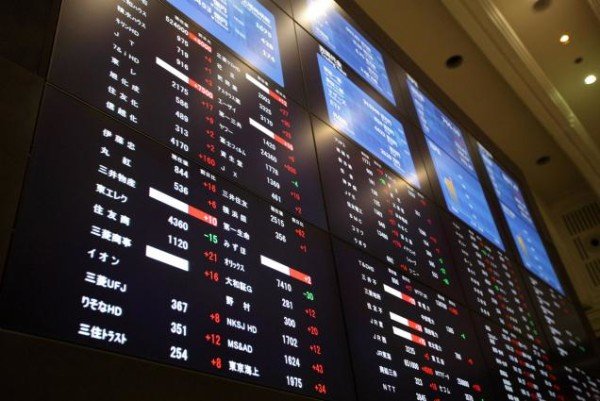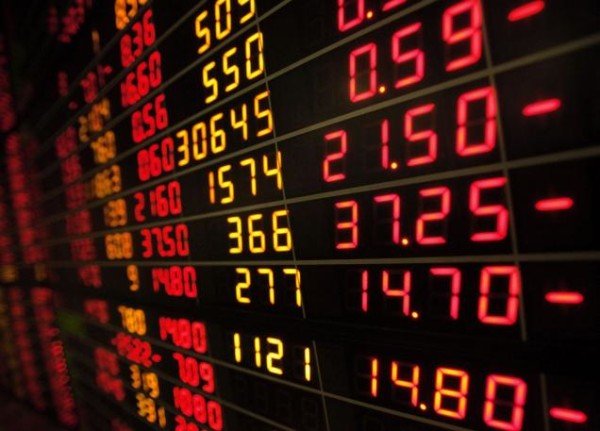Home Tags Posts tagged with "asian stock markets"
asian stock markets
Asian stock markets largely recovered in late trade, with trading volatile in the wake of the ECB’s latest stimulus measures.
On March 10, markets had initially cheered the European Central Bank’s move to cut rates and expand its quantitative easing plan.
However, hints later that the ECB might not cut rates further saw European and US markets go into reverse.
In Japan, the Nikkei 225 index fell 1% at first, but then recovered to end the day up 0.5% at 16,938.87.
In China, investors were looking ahead to some fresh economic data expected out of Beijing on March 12.
Analysts said retail sales may show some improvement over the combined January and February period, but that they were expecting industrial production and fixed-asset investment numbers to support the outlook for a continued overall economic slowdown in China.
March 12 numbers will combine January and February activity on the mainland in order to avoid any irregularities that could appear due to the Lunar New Year holiday.
Hong Kong’s Hang Seng index closed up 1.1% at 20,199.60, while the Shanghai Composite rose 0.2% to 2,810.31.
In Australia, the benchmark S&P/ASX 200 fell at first, but then recovered to close up 0.3% at 5,166.39.
South Korea’s Kospi index ended the day 0.1% higher at 1,971.41.
Asian stock markets have traded lower on October 13 following the release of disappointing Chinese trade numbers.
China’s latest economic data showed that imports in September fell by a more-than-expected 17.7% in yuan-denominated terms, while exports fell 1.1% from a year earlier.
The sharp fall in imports raised concerns on weakening domestic demand.
The Shanghai Composite ended up 0.2% at 3,293.23, while Hong Kong’s Hang Seng index closed down 0.6% at 22,600.46.
Japan’s benchmark Nikkei index ended down 1.1% at 18,234.74 after being closed for a public holiday on October 12.
Shares in electronics maker Sharp rose 6.5% on reports a government-backed fund may make an investment in the struggling firm.
In Australia, the S&P/ASX 200 closed down 0.9% at 5,202.9, dragged down by oil-related stocks following a sharp fall in crude prices on October 12.
South Korea’s benchmark Kospi finished lower by 0.13% at 2,019.05.
Asian stock markets have continued a global rally after New York’s main Dow Jones share index hit a historical record high.
Equity markets in Asia, the US and Europe have been buoyed by central bank attempts to revive economic growth by pumping cash into the financial system.
Analysts said that this has helped ease fears of continuing political problems and slower corporate profit growth.
In Asia on Wednesday, the main indexes in Japan and Australia hit their highest levels since September 2008.
Japan’s Nikkei was 1.1% higher in early trading while Australian shares were up 0.9%. Shares in Hong Kong, Shanghai and Singapore also posted gains.
The dollar eased 0.2% against a basket of key currencies while copper and crude oil prices rose.
The rally on Wall Street means the main US indexes have erased the losses brought on by the global financial crisis.
Dow Jones closed at 14,256 after investors were buoyed by signs of recovery in the US housing market in recent months, and data showing growth in the services sector.
The share index ended the day more than double its low of 6,547 in March 2009.
London’s FTSE 100 closed at a five-year high on Tuesday.
Analysts said sentiment was being boosted mainly because of the stimulus programs being conducted by the US, Europe and Japan.

Asian stock markets have continued a global rally after New York’s main Dow Jones share index hit a historical record high
In the US, Federal Reserve chairman Ben Bernanke has engaged in a campaign of massive bond-buying while keeping interest rates at a record low to help support the world’s largest economy after the global financial crisis in 2008.
The program known as quantitative easing or QE3, is in its third phase, and has been made open ended.
“To be sure, it was Bernanke’s reassurance, at last week’s congressional testimonies on monetary policy, to keep QE3 on its present course that turned a worried stock market into a record high,” said analysts at DBS Bank in Singapore.
The European Central Bank and the Bank of Japan have also taken steps to boost liquidity.
However, despite the positive sentiment on the markets analysts said there were risks on the horizon.
China’s move to curb high property prices, the impact of the US spending cuts as well uncertainty after the elections in Italy could still weigh on investors.
These concerns, however, are for now being overshadowed by the notion that central banks will continue to support the fragile global economic recovery.
“That’s fantastic testament to the power of easy money, in the face of doubts about the US economy now that fiscal spending is being cut back,” said Kit Juckes, from Societe Generale.
The European Central Bank, the Bank of Japan and the Bank of England will hold their policy meetings on Thursday.
Most analysts expect the three central banks to continue their policies aimed at spurring growth in their economies.
[youtube hd3dVEEDzeY]
Asian stock markets have risen, joining a global rally, after European Central Bank’s president, Mario Draghi, unveiled a plan targeted at easing the region’s debt crisis.
The ECB said it would buy bonds of the bloc’s debt-ridden nations in a bid to bring down their borrowing costs.
The implied borrowing costs for Spain and Italy fell after the announcement.
Japan’s Nikkei 225 index rose 2.2%, Korea’s Kospi gained 2.6% and Hong Kong’s Hang Seng added 2.4%.

Asian stock markets have risen after ECB unveiled a plan targeted at easing the region's debt crisis
“We think this is a credible plan to addressing the issue, and while there are still political hurdles, we expect those will be addressed,” said Alec Young, global equity strategist at S&P Equity Research.
The borrowing costs for some of the eurozone’s larger economies, such as Spain and Italy, had risen to levels considered unsustainable earlier this year.
That led to concerns that these nations would no longer be able to borrow money from international investors and, therefore, would not be able to repay their debts, further escalating the region’s debt crisis.
Many investors feared such developments would not only hurt the eurozone’s growth, but could also derail the global economic recovery.
That would have had a knock-on effect on Asia’s export-dependent economies, which rely heavily on global demand.
However, the ECB’s announcement, and the drop in borrowing costs of Spain and Italy thereafter, has helped allay those fears.
Markets in the US rose, with the Dow Jones index hitting it highest level in almost five years.
In Europe, Germany’s Dax index closed 2.9% higher, while France’s Cac 40 jumped 3% and the UK’s FTSE 100 rose 2.1%.
“The markets were looking for a strong decisive action and a commitment from the central bank that they are ready to act if any issues blow up in the region’s bigger economies,” said Justin Harper of IG Markets.
“Last night they got that.”
The ECB announcement also provided a boost to the euro currency, which rose against the US dollar and the Japanese yen.
The euro was trading at $1.263 in Asian trading. It also rallied against the Japanese currency to 99.63 yen.
Analysts said that the ECB’s plan had boosted investor morale and that they were more confident of investing in riskier assets.
“The ECB’s actions afford time, allowing risk appetite to stage a comeback, for now,” said Vincent Chaigneau, a strategist at Societe Generale.
However, they warned that while the ECB’s plan had helped allay market fears, the crisis was far from over.
“Mr. Draghi has won a battle, but cannot win the euro area crisis war by himself,” Vincent Chaigneau said.
“The hardest task of all – getting governments to drop posturing in return for leadership and deep reforms – still awaits us.”




